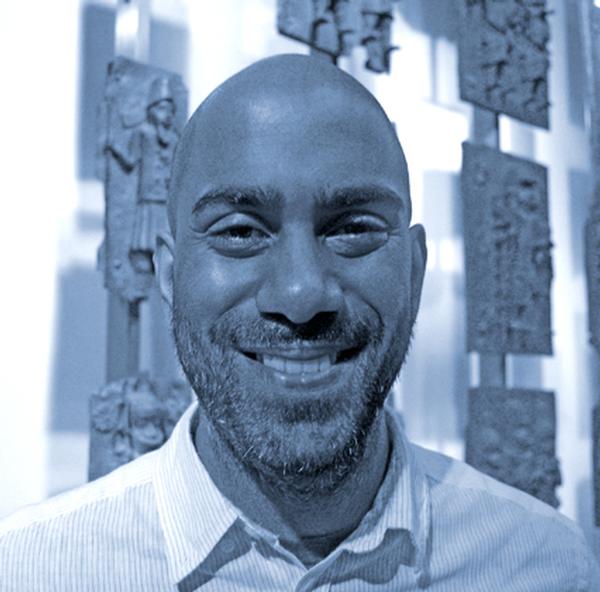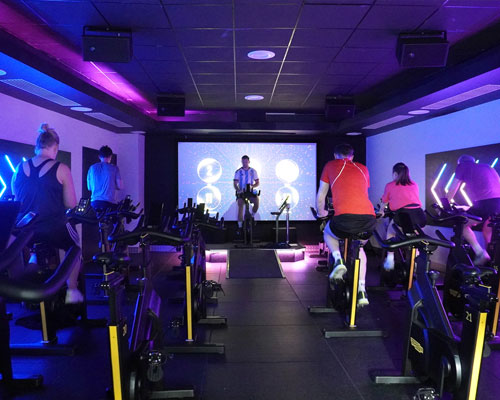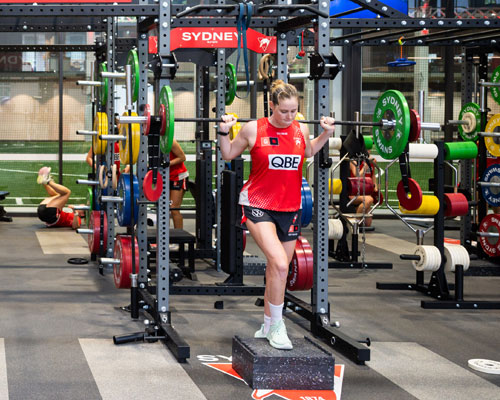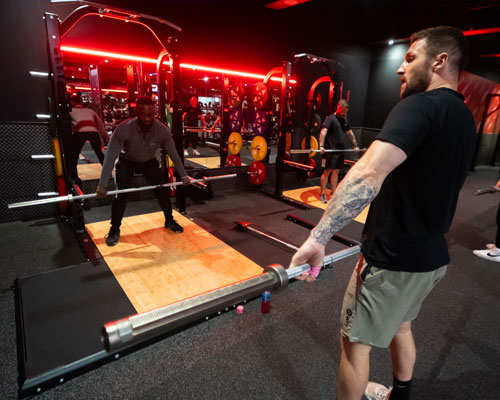features
Talking Point: The fat and fit myth
Research from the University of Birmingham has busted the myth that you can be fat and fit, meaning that it’s more important than ever to help people achieve and maintain a healthy weight. Kath Hudson explores what the findings mean for gym operators

People who are obese, but have no initial signs of heart disease, diabetes or high cholesterol are not protected from ill health later in life, according to the latest research.
Led by Dr Rishiraj Caleyachetty, the study analysed GP records of 3.5m metabolically healthy obese people in the UK, between 1995 and 2015. It tracked people who were obese at the start of the study – with a BMI of 30 or more – but who had no evidence of high blood pressure, high cholesterol or diabetes.
Compared to normal weight people, the researchers found that obese people, with no metabolic abnormalities, had a 50 per cent higher risk of coronary heart disease, a 7 per cent increased risk of cerebrovascular disease and a doubled risk of heart failure. The research also found that the risk of cardiovascular disease events in obese individuals grew with the increased number of metabolic abnormalities present.
Obesity is a complex issue, which involves planners, employers and the food industry, as well as the NHS and the health and fitness sector, but what more can operators do to reach out to those who are obese, and make sure that the people who join clubs understand the importance of maintaining a healthy weight? We ask the experts…
Dr Rishiraj Caleyachetty,
Epidemiologist & Lead Study Author,
University of Birmingham Institute of Applied Health Research

These findings were no surprise, as previous studies had suggested similar, but our research is more conclusive.
Our preliminary findings were presented at the European Congress on Obesity in May and the full research paper is currently under review. When published it will present all the caveats and nuances of our work and some of our suggestions.
Fitness industry professionals should support people to achieve and maintain their optimum weight, which includes helping those who are obese to adopt and maintain more healthy behaviours.
The lose weight message needs to be framed so as not to offend people, and to encourage them to adopt healthy behaviours and to support them.
However, it’s important to not give simplified advice: we need to remember obesity is a complicated issue, which results from a complex interaction between diet, physical activity and the wider social and physical environments.
Trials have shown exercise in adults with obesity can reduce body weight, when combined with maintaining a healthy diet – increased fish, fruits and vegetables and fibre, combined with a reduction in the intake of sugar.
Obesity is partly individual responsibility, but the context also needs to be addressed. It’s encouraging that the government is planning a sugar tax, as levels are too high in things like soft drinks.
The main role for the health and fitness industry is to continue its good work, engage with local stakeholders’ physical activity initiatives and keep devising programmes that can help people adopt and maintain healthy behaviours.
Although obesity is rising globally, there are regions with flat trends, or even decreases – central and Eastern Europe for women and central Africa and South Asia for men. We can expand our knowledge through studying these trends.
“It’s important not to give simplified advice about obesity. It’s a complicated issue, which results from a complex interaction between diet, activity and social and physical environments.” – Dr Rishiraj Caleyachetty
Dr Mike Knapton,
Associate Medical Director,
British Heart Foundation

This is another study highlighting that, if you are overweight, you are more likely to suffer from heart disease. It’s not often that research on this scale and magnitude is able to clarify an age-old myth such as the possibility of being fat and fit and these findings should be taken extremely seriously.
The NHS has its part to play in addressing this public health challenge and it’s important that advice is given about the risk of heart and circulatory disease, along with the lifestyle choices that can reduce this risk: not smoking, eating a balanced diet, exercising regularly and limiting alcohol intake to the recommended levels.
The time has come when we – GPs and gym operators alike – need to have the conversation with people about losing weight. It’s important not to blame them or make them feel it’s their fault. People don’t choose to be overweight – it’s the result of a number of circumstances, including poverty, being caught up with other issues, motivation or lack of access to healthy food options and environments in which to be physically active.
When advising people to lose weight, avoid the use of the word diet. This implies temporary change, but people need support to make a permanent change. Help to identify their individual reasons for wanting to lose weight – writing it down is great for ongoing motivation.
I witness fatalism among overweight people – sometimes they believe it’s too late for them and they say they will just focus on their children rather than themselves. But these people could be persuaded to go on a journey with their families, all embracing a different lifestyle and being more physically active together.
Gyms need to take onboard these messages and work to break down the barriers that prevent people from entering their facilities, such as being intimidated by the gym environment and the fit lycra-clad people. For example, separate sessions could be offered to particular groups, private areas created in the gym, or walking groups organised to help people through the initial difficult stages back to activity.
Obesity is something that needs tackling from a broad perspective, with planners, local and national government, educators and the food and drink industry all playing their part.
"Gyms need to break down barriers – for example, separate sessions could be offered, private areas created in the gym, or walking groups organised to help people through the initial difficult stages back to activity" – Dr Mike Knapton
Steven Ward,
CEO,
ukactive

These are preliminary results, and we look forward to seeing the full findings once this report has been peer-reviewed and published. What’s clear already is that we must move past the archaic BMI measure of health and embrace more sophisticated body composition tools to give people a clearer picture.
The size of our waistlines can be a useful indicator of increased risk to disease, but the health of our hearts and our body fat percentage compared to muscle is of equal if not greater importance.
Our sector is entering a new age of data-driven insight led by next generation equipment and technology. Soon, “I think I’m alright” will cease to apply as an answer when gym members are asked how they’re doing. Expect companies such as MYZONE, Fitquest, BodyStat and ReferAll (plus ukactive ActiveLab entrants like LiveSmart) to help operators show their members their exact body fat metrics and offer them personalised physical and digital solutions.
The mass of data at customers’ fingertips means they’re better informed about their physical state than ever. Soon they’ll have data about their mental and emotional state, plus how this affects their energy levels, mood and perceptions of stress thus influencing their readiness to exercise.
Activity providers must ensure our workforce (and digital tools deployed to support it) is fully-enabled to help process this information and apply it in a meaningful way.
Accelerating into the future will require greater willingness within the sector to pool knowledge and share data, as operators recognise the mutual benefits of collaborative analysis of the market and a solid evidence base of what really works.
"Our sector is entering a new age of data-driven insight led by next generation equipment and technology to help operators show members their exact body fat metrics and offer personalised physical and digital solutions " – Steven Ward
Professor Thomas Sanders,
Emeritus Professor of Nutrition and Dietetics,
King’s College London:

This research found those with obese BMI, but who are metabolically healthy, have an increased risk of heart disease. However, it doesn’t reflect that many of those who developed diabetes in the follow up period would have done anyway, as they aged.
You’re more likely to get diabetes if you’re fat, but you can be fat for a long time before getting it. A fat, 45-year-old white man is not likely to get diabetes for another 10 years. Where you deposit fat also has a bearing: around the abdominal area is more of a problem than if it is all over the body. Age is the main thing that drives risk, but there are things that jack up the risk, such as smoking and drinking.
Exercise really cuts the risk of getting diabetes. There’s lots of good trial data showing physical activity is more effective at preventing diabetes in people who are overweight than those who are inactive. The problem is that it becomes harder to exercise as you get older and develop illnesses, like arthritis or hip problems. Going forward, finding ways to keep this demographic active is really important.
It’s optimal to diet and exercise together: exercise is not a weight loss strategy on its own, but it’s important because it maintains muscle mass. When helping people to lose weight there are some simple rules: cut down beer, as this is often a problem with men; eat fewer carbohydrates – most people could easily halve the amount they eat. Eat smaller portions, avoid moreish confectionery and be careful of frying starchy foods, as they soak up the oil.
It’s important for health and fitness operators to start talking to their members about their diets and help them set and achieve realistic targets and then maintain the weight loss. Many people need help to change their eating and exercise behaviours for the long term.
The food industry has its part to play. It’s interesting to note that vegetarians have traditionally had lower BMI scores than meat eaters, and vegans have always maintained good body weights. However, as there’s now a greater choice of processed food available to them, they’re seeing increases in their BMI as well.
"It’s important for health and fitness operators to talk to members about their diet, help them set and achieve realistic targets and then maintain weight. Many people need help to change their eating and exercise behaviours for the long term" – Professor Thomas Sanders















































































